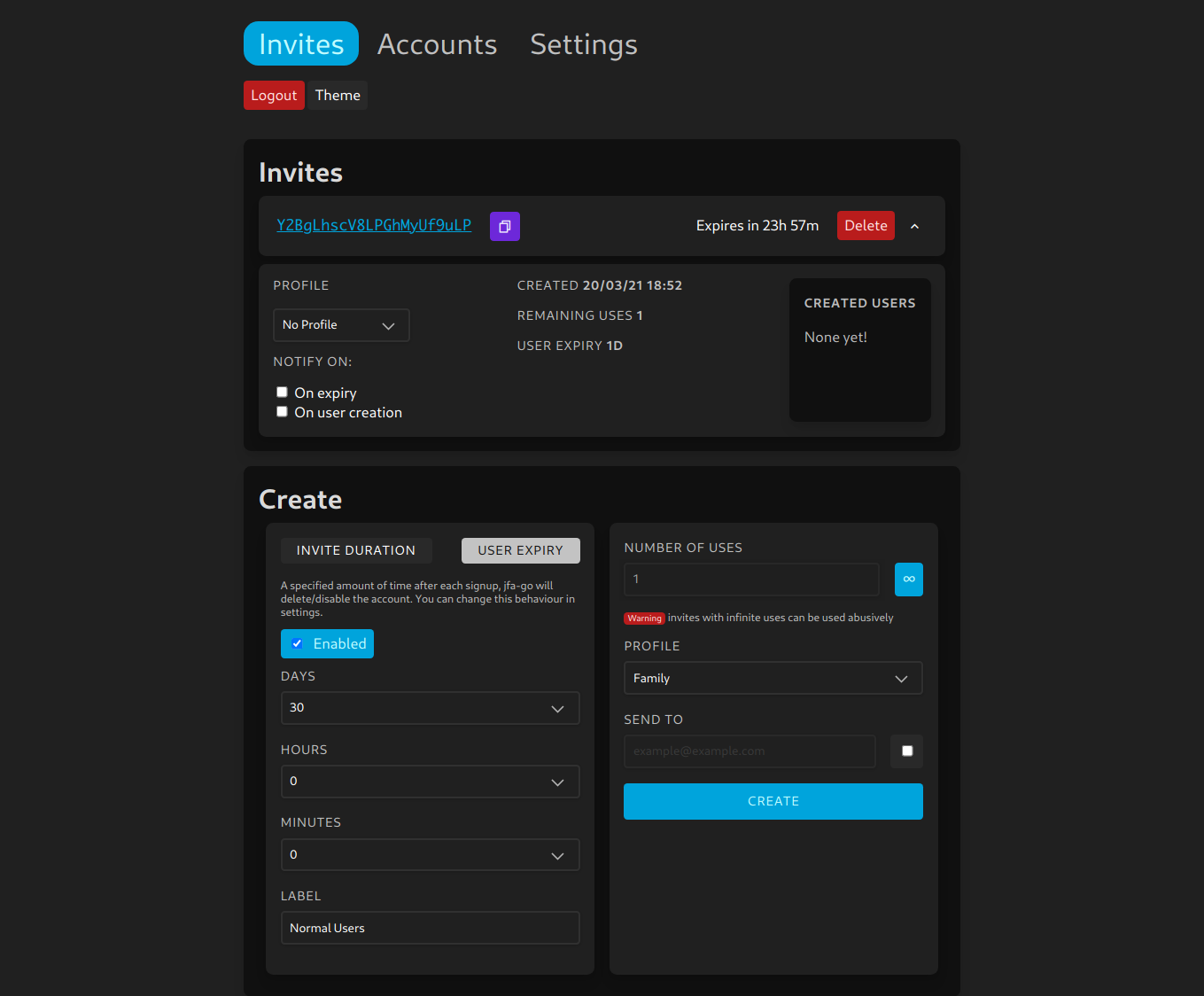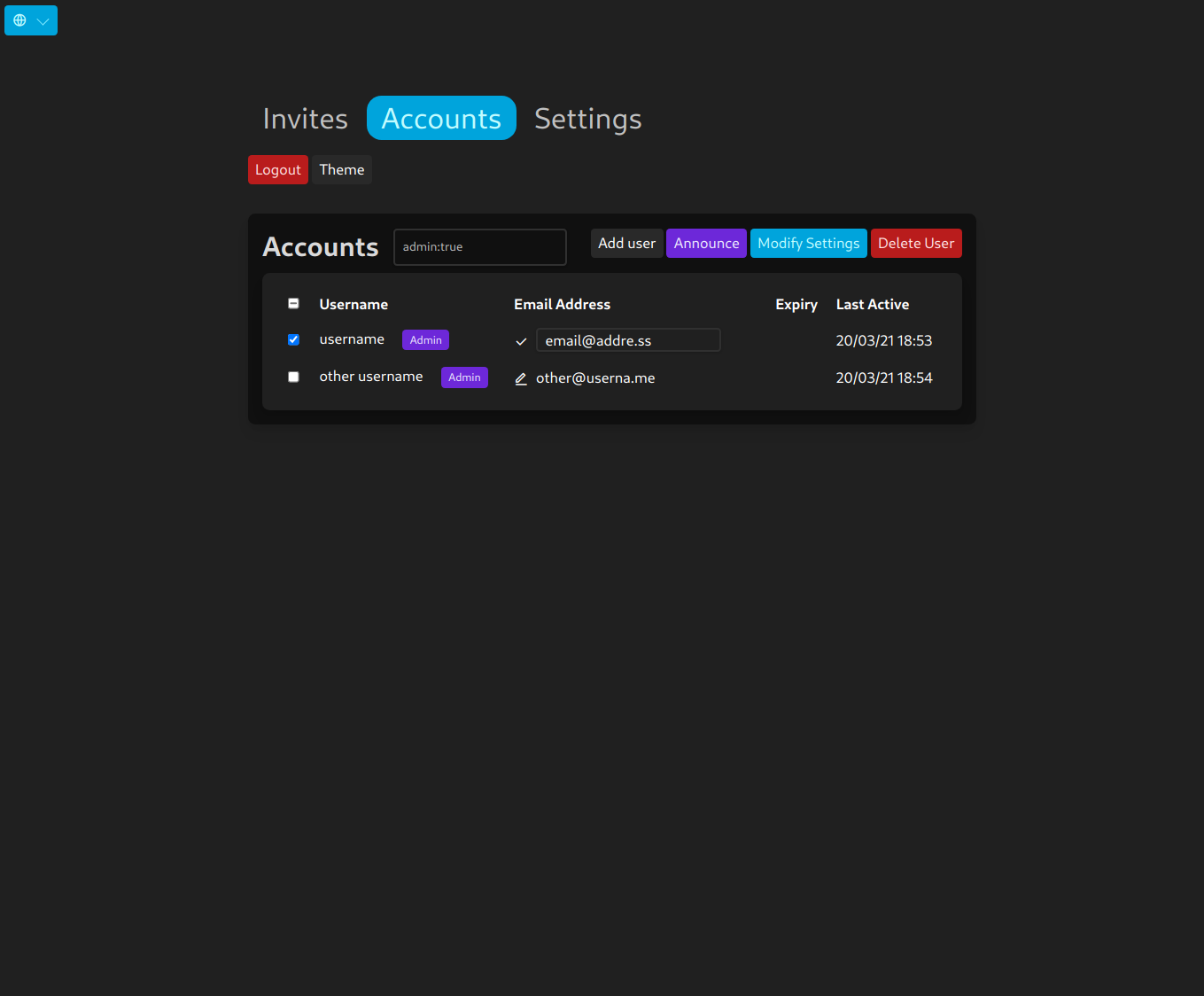When signing up, the user is given a pin code which they send to a telegram bot. This provides user verification, but more importantly allows the bot to message the user, as the Telegram API requires the user to interact with the bot before it can do the opposite. The bot should recognize the correct language, but a /lang command is also provided to change it. The verification process is pretty much functional but ui is still broken, and it isn't properly integrated yet. |
||
|---|---|---|
| .github | ||
| common | ||
| config | ||
| css | ||
| docs | ||
| html | ||
| images | ||
| lang | ||
| logger | ||
| ombi | ||
| scripts | ||
| static | ||
| ts | ||
| .drone.yml | ||
| .gitignore | ||
| .goreleaser.yml | ||
| api.go | ||
| args.go | ||
| auth.go | ||
| config.go | ||
| CONTRIBUTING.md | ||
| daemon.go | ||
| Dockerfile | ||
| email.go | ||
| external.go | ||
| go.mod | ||
| go.sum | ||
| internal.go | ||
| jfa-go.service | ||
| lang.go | ||
| LICENSE | ||
| main.go | ||
| Makefile | ||
| models.go | ||
| package-lock.json | ||
| package.json | ||
| pwreset.go | ||
| pwval.go | ||
| README.md | ||
| restart_windows.go | ||
| restart.go | ||
| router.go | ||
| setup.go | ||
| static.go | ||
| storage.go | ||
| stripmd.go | ||
| telegram.go | ||
| template.go | ||
| updater.go | ||
| userdaemon.go | ||
| views.go | ||
Downloads:
dockerhub | stable | nightly | aur stable | aur binary | aur nightly
jfa-go is a user management app for Jellyfin (and now Emby) that provides invite-based account creation as well as other features that make one's instance much easier to manage.
Features
- 🧑 Invite based account creation: Sends invites to your friends or family, and let them choose their own username and password without relying on you.
- Send invites via a link and/or email
- Granular control over invites: Validity period as well as number of uses can be specified.
- Account profiles: Assign settings profiles to invites so new users have your predefined permissions, homescreen layout, etc. applied to their account on creation.
- Password validation: Ensure users choose a strong password.
- ⌛ User expiry: Specify a validity period, and new users accounts will be disabled/deleted after it. The period can be manually extended too.
- 🔗 Ombi Integration: Automatically creates Ombi accounts for new users using their email address and login details, and your own defined set of permissions.
- Account management: Apply settings to your users individually or en masse, and delete users, optionally sending them an email notification with a reason.
- 📨 Email storage: Add your existing users email addresses through the UI, and jfa-go will ask new users for them on account creation.
- Email addresses can optionally be used instead of usernames
- 🔑 Password resets: When users forget their passwords and request a change in Jellyfin, jfa-go reads the PIN from the created file and sends it straight to the user via email.
- Notifications: Get notified when someone creates an account, or an invite expires.
- 📣 Announcements: Bulk email your users with announcements about your server.
- Authentication via Jellyfin: Instead of using separate credentials for jfa-go and Jellyfin, jfa-go can use it as the authentication provider.
- Enables the usage of jfa-go by multiple people
- 🌓 Customizations
- Customize emails with variables and markdown
- Specify contact and help messages to appear in emails and pages
- Light and dark themes available
Interface
Install
The Docker image is your best bet.
docker create \
--name "jfa-go" \ # Whatever you want to name it
-p 8056:8056 \
# -p 8057:8057 if using tls
-v /path/to/.config/jfa-go:/data \ # Path to wherever you want to store the config file and other data
-v /path/to/jellyfin:/jf \ # Path to Jellyfin config directory, ignore if using Emby
-v /etc/localtime:/etc/localtime:ro \ # Makes sure time is correct
hrfee/jfa-go # hrfee/jfa-go:unstable for latest build from git
Available on the AUR as jfa-go, jfa-go-bin or jfa-go-git.
For other platforms, grab an archive from the release section for your platform (or nightly builds here), and extract the jfa-go executable to somewhere useful.
- For *nix/macOS users,
chmod +x jfa-gothen place it somewhere in your PATH like/usr/bin.
Run the executable to start.
Build from source
If you're using docker, a Dockerfile is provided that builds from source.
Otherwise, full build instructions can be found here.
Usage
Simply run jfa-go to start the application. A setup wizard will start on localhost:8056 (or your own specified address). Upon completion, refresh the page.
Usage of ./jfa-go:
-config string
alternate path to config file. (default "~/.config/jfa-go/config.ini")
-data string
alternate path to data directory. (default "~/.config/jfa-go")
-debug
Enables debug logging and exposes pprof.
-host string
alternate address to host web ui on.
-port int
alternate port to host web ui on.
-swagger
Enable swagger at /swagger/index.html
Systemd
jfa-go does not run as a daemon by default. Run jfa-go systemd to create a systemd .service file in your current directory, which you can copy into ~/.config/systemd/user or somewhere else.
If you're switching from jellyfin-accounts, copy your existing ~/.jf-accounts to:
XDG_CONFIG_DIR/jfa-go(usually ~/.config/jfa-go) on *nix systems,%AppData%/jfa-goon Windows,~/Library/Application Support/jfa-goon macOS.
(or specify config/data path with -config/-data respectively.)
Contributing
See CONTRIBUTING.md.
Translation
For translations, use the weblate instance here. You can login with github.





